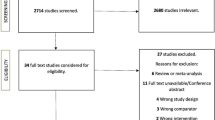Abstract
In order to minimize neurological symptoms and treatment-related side-effects, patients with primary or secondary brain tumors receive dexamethasone. The goal of this study was to analyze dosage and duration of dexamethasone intake and to compare the advantages and disadvantages of this medication during the course of radiation therapy (RT). Data from 138 consecutive patients were therefore analyzed retrospectively. During the course of therapy, the dosage of dexamethasone was evaluated, as were the indications for and duration of this treatment, its side-effects and any clinical changes reported during dexamethasone intake. The dosage of dexamethasone was higher at the outset and during RT (median 7–12 mg/day) than at the end of RT (median 1–6 mg/day). The average duration of dexamethasone intake was 23 weeks for patients with primary, and 7 weeks for patients with secondary brain tumors. The most frequent side-effects were a rise in serum glucose level, peripheral edema, psychiatric disorders, and Cushing's syndrome. Life-threatening complications remained rare. Initially, dexamethasone led to good clinical improvement with few side-effects of RT, whereas by the end of RT the symptom relief was slight and toxicity increased. In a group of 13 patients who received no dexamethasone during RT, 12 showed neither RT-related side-effects nor of neurological impairment. Dexamethasone effectively minimizes neurological symptoms and RT-related side-effects in patients with primary and secondary brain tumors. Nevertheless, the side-effects of dexamethasone itself increase over time. For this reason, a generalized dose scheme should not be used. Instead, dosage should be adapted to each patient's individual needs. Future prospective studies will have to determine whether dexamethasone is advantageous on balance or not.
Similar content being viewed by others
Author information
Authors and Affiliations
Additional information
Electronic Publication
Rights and permissions
About this article
Cite this article
Hempen, C., Weiss, E. & Hess, C.F. Dexamethasone treatment in patients with brain metastases and primary brain tumors: do the benefits outweigh the side-effects?. Support Care Cancer 10, 322–328 (2002). https://doi.org/10.1007/s00520-001-0333-0
Published:
Issue Date:
DOI: https://doi.org/10.1007/s00520-001-0333-0




